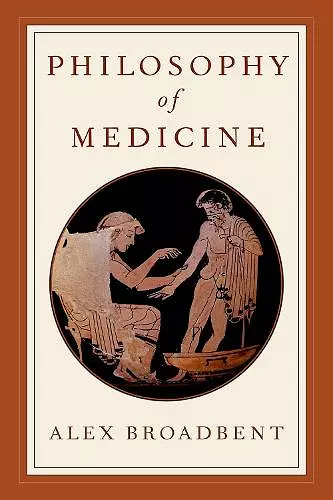Philosophy of Medicine
Format:Hardback
Publisher:Oxford University Press Inc
Published:14th Mar '19
Currently unavailable, and unfortunately no date known when it will be back
This hardback is available in another edition too:
- Paperback£20.99(9780190612146)

Philosophy of Medicine asks two central questions about medicine: what is it, and what should we think of it? Philosophy of medicine itself has evolved in response to developments in the philosophy of science, especially with regard to epistemology, positioning it to make contributions that are medically useful. This book locates these developments within a larger framework, suggesting that much philosophical thinking about medicine contributes to answering one or both of these two guiding questions. Taking stock of philosophy of medicine's present place in the landscape and its potential to illuminate a wide range of areas, from public health to policy, Alex Broadbent introduces various key topics in the philosophy of medicine. The first part of the book argues for a novel view of the nature of medicine, arguing that medicine should be understood as an inquiry into the nature and causes of health and disease. Medicine excels at achieving understanding, but not at translating this understanding into cure, a frustration that has dogged the history of medicine and continues to the present day. The second part of the book explores how we ought to consider medicine. Contemporary responses, such as evidence-based medicine and medical nihilism, tend to respond by fixing high standards of evidence. Broadbent rejects these approaches in favor of Medical Cosmopolitanism, or a rejection of epistemic relativism and pluralism about medicine that encourages conversations between medical traditions. From this standpoint, Broadbent opens the way to embracing alternative medicine. An accessible and user-friendly guide, Philosophy of Medicine puts these different debates into perspective and identifies areas that demand further exploration.
A fascinating and compelling discussion that brings to light an exciting area in the philosophy of science. As such, the book is an excellent starting point for anyone wishing to explore the rapidly growing literature on this remarkable subject. * Alexander Mebius, Journal for General Philosophy of Science *
An important issue discussed [in this book] is attitudes towards patients with incurable diseases. The book has a large reference list...Recommended for physicians, psychologists and social workers. * PER (Pediatric Endocrinology Reviews) *
This well-written book is a contribution to the burgeoning literature in philosophy of medicine--it offers interesting and compelling theories about various aspects of medicine, including its aims, shortcomings, research methods, and colonial heritage. * Jacob Stegenga, Lecturer in Philosophy of Science, University of Cambridge *
Alex Broadbent's Philosophy of Medicine addresses important topics that have been largely eclipsed by debates on bioethics and the nature of health and disease. In particular, Broadbent focuses on the core issues of what medicine is essentially and how to make medical decisions. His book makes significant contributions to the field not only by addressing neglected topics with historical and cultural sensitivity, but also through some ground-breaking claims, for instance that the business of medicine is not to cure. * Thaddeus Metz, Distinguished Professor of Philosophy, University of Johannesburg *
The first thing to love about this book is what you can learn from it: what medicine can do even if it can't cure much, what evidence-based medicine may have achieved and what it may not have, the role of common law and the importance of cosmopolitanism, the dangers of epistemic medical relativism, a value-free definition of 'health' and much more. The second is that it practices what it preaches. The epistemic humility and practice-centered cosmopolitanism that Broadbent advocates for medicine characterize his own arguments and explanations. The book is thoughtful, humane, informed, a serious study, both philosophically and practically. * Nancy Cartwright, Professor of Philosophy at Durham University and Distinguished Professor at University of California, San Diego *
ISBN: 9780190612139
Dimensions: 145mm x 213mm x 23mm
Weight: 448g
296 pages